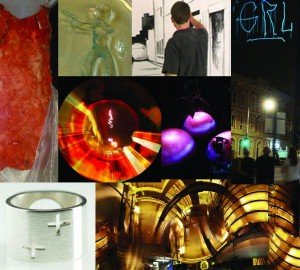Throughout its 21-year history ANAT has consistently incorporated interdisciplinary collaborations into its mindset, agenda and strategic planning – however, such an approach has not felt as timely as it does today.

A mashup of ANAT supported projects where collaboration between disciplines has been vital. Clockwise from top: Fibre Reactive by Donna Franklin, Infection Complete by Alicia King, Detour 27 by Thomas Buchanan, Graffiti Research Lab, Observing baryogenesis by Chris Henschke, Cross Ring by Leah Heiss. Middle: Optical Nervous System still by David McConville, Void Love by Willoh Weiland and Nicky Forster, image by Davina Adamson.
Perhaps in this digital world, where as a society, we run the risk of occupying the space of disembodied consciousness, the widening scope of creative practice (so often enhanced by collaboration), becomes all the more pertinent.
While the most rudimentary definition of interdisciplinarity, “…the pursuit of a common task”, accurately describes many of the projects and partnership ANAT supports, one wonders if the wider community adopts this mindset? Do the broader creative industries, the funding body mechanisms and various government institutions all strive for the same end result – a more vibrant, economically and culturally rich environment?
And within this, where do digital communities sit? Do we run the risk of instrumental priorities overtaking the creative outcome – where industry becomes the service provider, and artists the purveyors of “bling”, dazzling from the sidelines?
ANAT believes interdisciplinarity is critical to the success and survival of creative practitioners in an increasingly competitive and commercially focused marketplace. With the release of Filter 73, ANAT encourages and invites a progression of dialogue around the conceptualisation and realization of such practices.
Alan O’Connor discusses entrepreneurship and multidisciplinary learning, whilst ANAT CEO, Gavin Artz, outlines various approaches to interdisciplinary practice and the changing contexts in play across the field.
Lucy Benson reviews Transmediale 10, in particular its futuristic themes and the financial sustainability of the creative industries (a topic that will be discussed in more detail in the next issue of Filter).
Also included is a call for applications to ANAT’s Synapse Residency program, which enables collaborations between the arts and sciences, and we hear from Daniel Kotja and Gordon Monro about their experiences at Super Human: Revolution of the Species.
We hope you enjoy this issue and encourage you to enter into the dialogues by submitting your comments alongside the articles!
Amanda Matulick
An enthusiastic ‘geek-in-learning’, Amanda’s passion for digital communication and online environments has seen her transition Filter Magazine from hard format into digital, optimising the amount of value added content. As well as managing ANAT’s communications and marketing strategies, she is regularly invited to speak and write about the impact of digitisation on arts publishing.
 This work is licensed under a Creative Commons Attribution-NonCommercial-ShareAlike 2.5 Australia.
This work is licensed under a Creative Commons Attribution-NonCommercial-ShareAlike 2.5 Australia.






